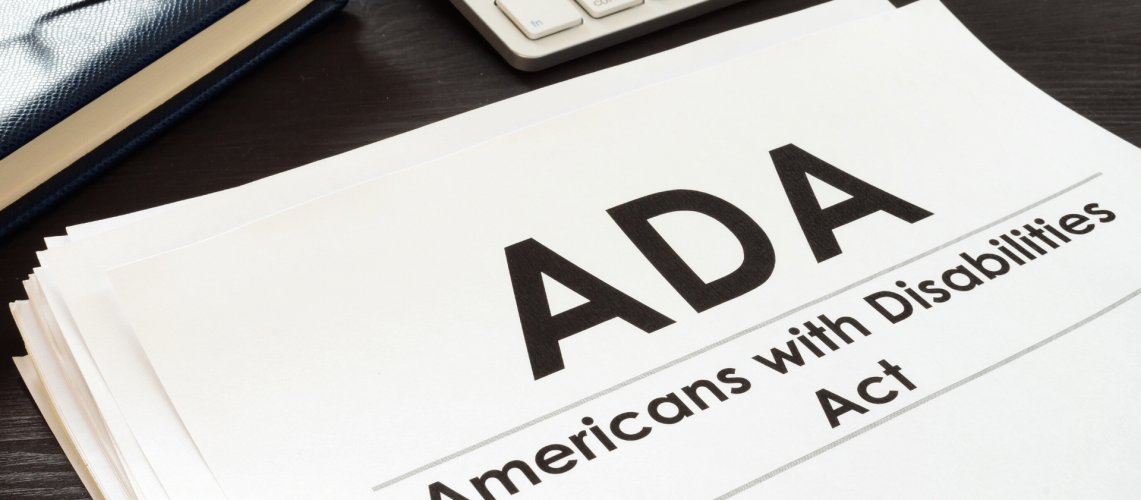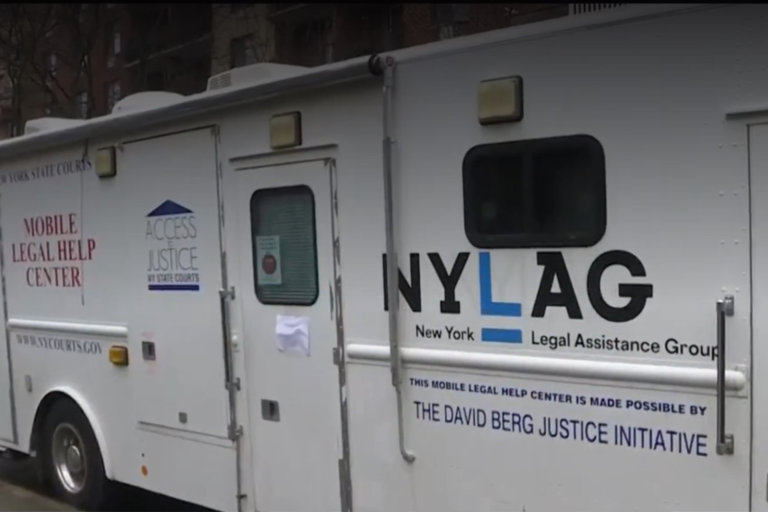The Americans with Disabilities Act of 1990 (ADA) was passed to fight discrimination against people with disabilities and increase their access to stores, restaurants, and other buildings, which the law refers to as “places of public accommodation.”
The ADA sets out the access requirements for places of public accommodation, including almost all small businesses. The law says that “a disabled person may not be denied access to the full and equal enjoyment of goods or services to which the public has access.” The law may require a small business to take “readily achievable” steps to provide better access for disabled people. These steps may include removing physical barriers. The steps may be as simple as reorganizing seating, but sometimes the steps require extensive structural renovations.
NYLAG’s Pro Se Clinic has compiled a list of frequently asked questions (FAQs) for small business owners on the ADA and ADA lawsuits.
The complaint says that I or my small business failed to provide access to a disabled person in violation of the Americans with Disabilities Act (ADA). What should I do?
Call 212-659-6190 to set up a free meeting with our legal clinic to get advice on whether you should settle the case, fight the case, or hire an attorney. The clinic can help you decide the best way to handle your case. Small business owners can unintentionally violate the ADA even if they have tried their best to follow the law, so these cases must be taken seriously. DO NOT ignore the lawsuit without speaking to an attorney first.
What if I haven’t been sued yet, but I got a letter from someone claiming to be an attorney for a person with disabilities?
You should follow the same advice for the first question. You should not wait until you have been sued to act. Settling an ADA lawsuit before it is filed in court is often the cheapest way to get rid of it, but you should speak with a legal professional to determine the best way to deal with your specific case.
I don’t discriminate against people with disabilities, why am I being sued?
The ADA’s requirements are not always obvious to small business owners, and when a person with a disability believes that a business is not complying with the ADA, that individual may sue the business. Many private attorneys and non-profits bring these lawsuits to make sure that small businesses fix violations and increase access. These lawsuits are important for enforcing the ADA and making businesses more accessible to people with disabilities.
However, not all ADA lawsuits are brought with the goal of helping people with disabilities. Some private attorneys have turned the statute into a money-making scheme without concern for decreasing discrimination and increasing access. These lawyers know that many small businesses won’t have the money to hire a lawyer and will choose to settle. Cases brought by these lawyers are called “ADA drive-by,” “ADA troll,” or “ADA extortion” cases. In some of these cases, a single lawyer sues many (sometimes several hundred) small businesses for violating the ADA. These violations may include, among others, the lack of an entrance ramp, a ramp that is too steep, lack of handrails, inaccessible bathroom fixtures, or websites that are hard to use by people who are sight-impaired.
Unlike lawyers at non-profits and other reputable law firms, who usually make sure that the renovations are actually made once the case has settled, “ADA trolls” rarely follow up to make sure that accessibility problems have been fixed.
What are defenses to ADA troll cases?
Almost all federal civil cases settle. This includes ADA troll cases. Generally, a small business facing an ADA access case should first correct any accessibility issues raised by the lawsuit and then try to settle as soon as possible for as little as possible.
In some cases, for small businesses with enough money or insurance policies, it may make sense to hire a lawyer to fight the lawsuit. But it takes a lot of work and costs a lot to fight these cases. Some defenses include: that the Plaintiff’s lawyer has filed lawsuits for people with disabilities without speaking to them, for people who don’t exist, for people who are not disabled, or for people who never intended to visit the business or never intended to return to the business. Another defense is that the business did not violate the ADA and always provided the required access to people with disabilities. But it is rare for small businesses to win based on these defenses.
What’s the worst thing that can happen?
There are two worst-case scenarios.
First, if you and your business fail to follow certain steps to “appear” in the case, a judge may order default judgment against you for a large amount of money. Second, if you fight the lawsuit until the end and lose, the judge may also award the plaintiff an amount of money that is much higher than if the case had ended with an early settlement. This money would be in addition to any money that you might have paid to an attorney to defend the case.
The plaintiff may collect either type of judgment from you or your business in many different ways, including through garnishment, liens, a collection agency, or other means. These methods of collection can have damaging consequences for your business.
How can my business avoid these ADA lawsuits now or in the future?
To help avoid “drive-by lawsuits,” a small business should fix any barriers that are obvious from the sidewalk or from the street. The ADA violations that most often lead to lawsuits in New York City include lack of a visible entrance ramp, a ramp that is too steep, lack of handrails, lack of a highly visible “doorbell” to notify employees inside the business that a person outside needs assistance entering, or doors that are difficult for persons with disabilities to open. For small businesses that have websites, another violation that often leads to lawsuits is a website that is not easy for people with sight impairments to use. Fixing these “obvious” violations can help a small business owner avoid some lawsuits.
A small business may also protect itself, and at the same time increase access and its customer base, by paying for an expert evaluation and fix any problems. For example, there are government-funded regional ADA centers throughout the United States that offer customized assistance to make a business ADA compliant.
Unfortunately, there is nothing that a small business can do to eliminate all risk of a disability access lawsuit. Even if a business fully complies with all ADA rules, there will always be dishonest lawyers who may file meritless lawsuits because they know that small business owners can’t afford to pay a lawyer or to risk losing the case. These lawyers know that small businesses often have no choice but to settle. Therefore, a small business that does not have insurance for ADA claims may choose to purchase it.
The information contained in this post is for information purposes only and is not legal advice. It is not a substitute for getting legal advice. It is not advertising or a solicitation. The New York Legal Assistance Group provides limited scope legal assistance to both ADA plaintiffs and defendants, but never to both in the same case.
Last updated: April 8, 2020








